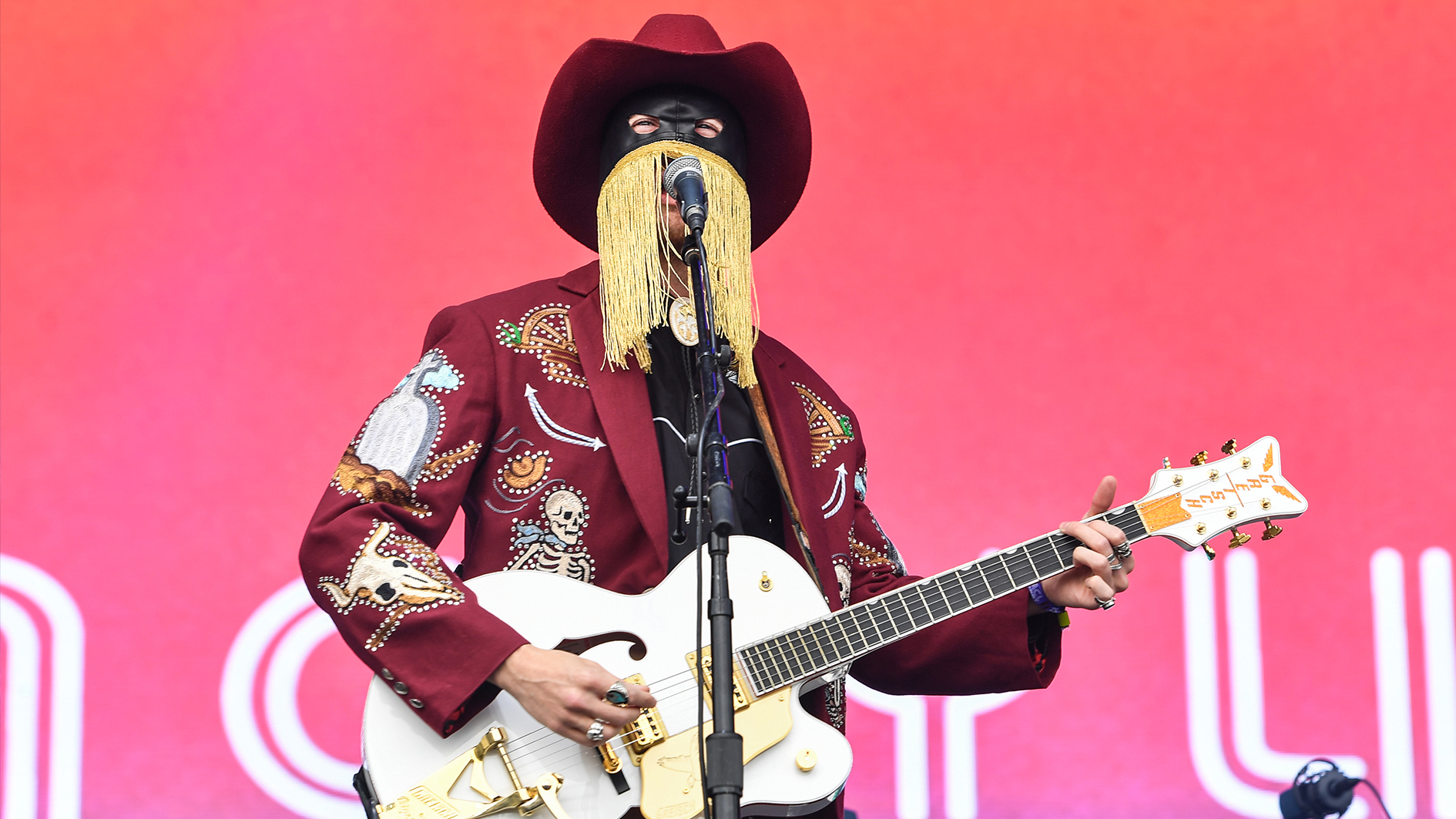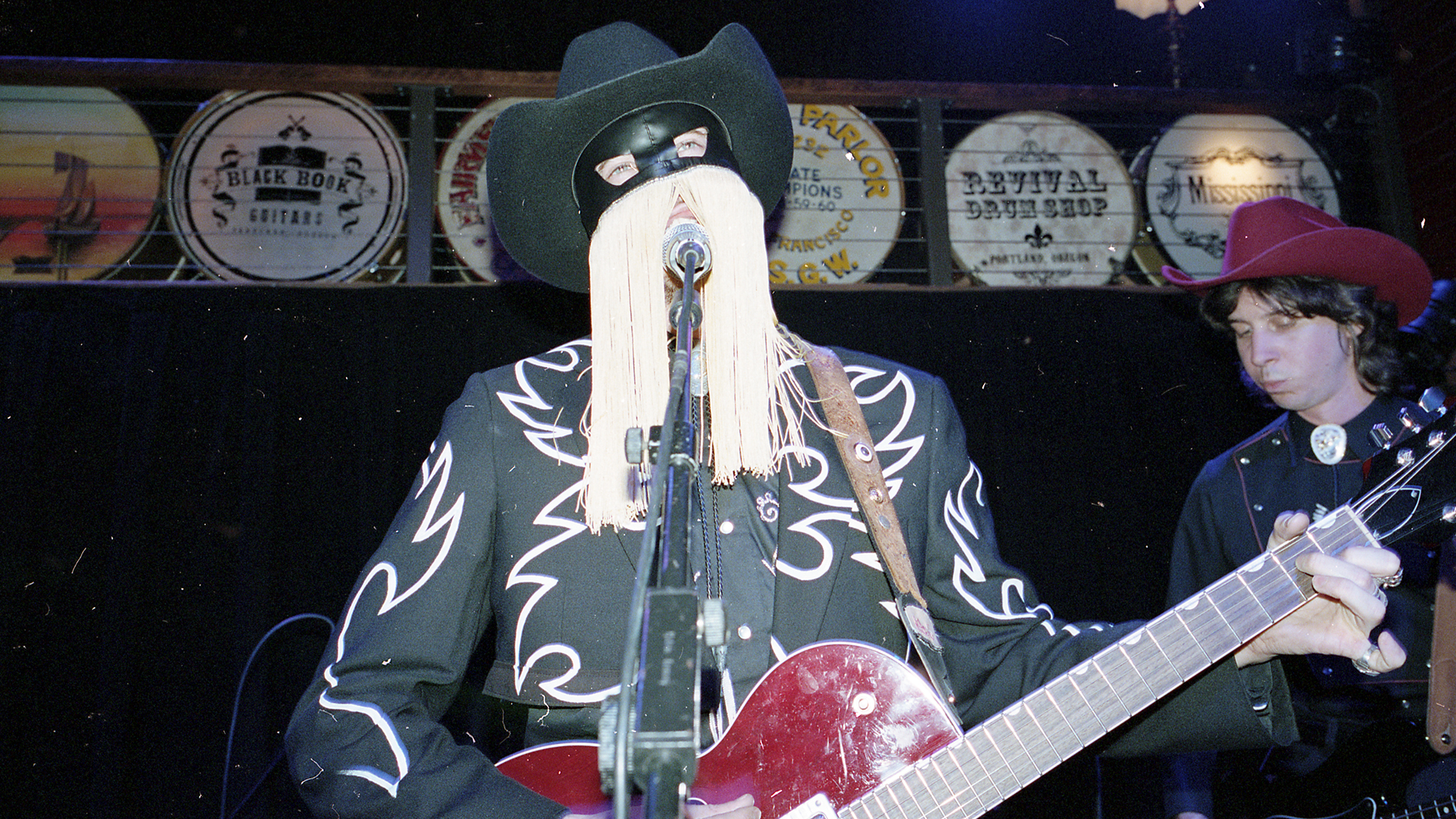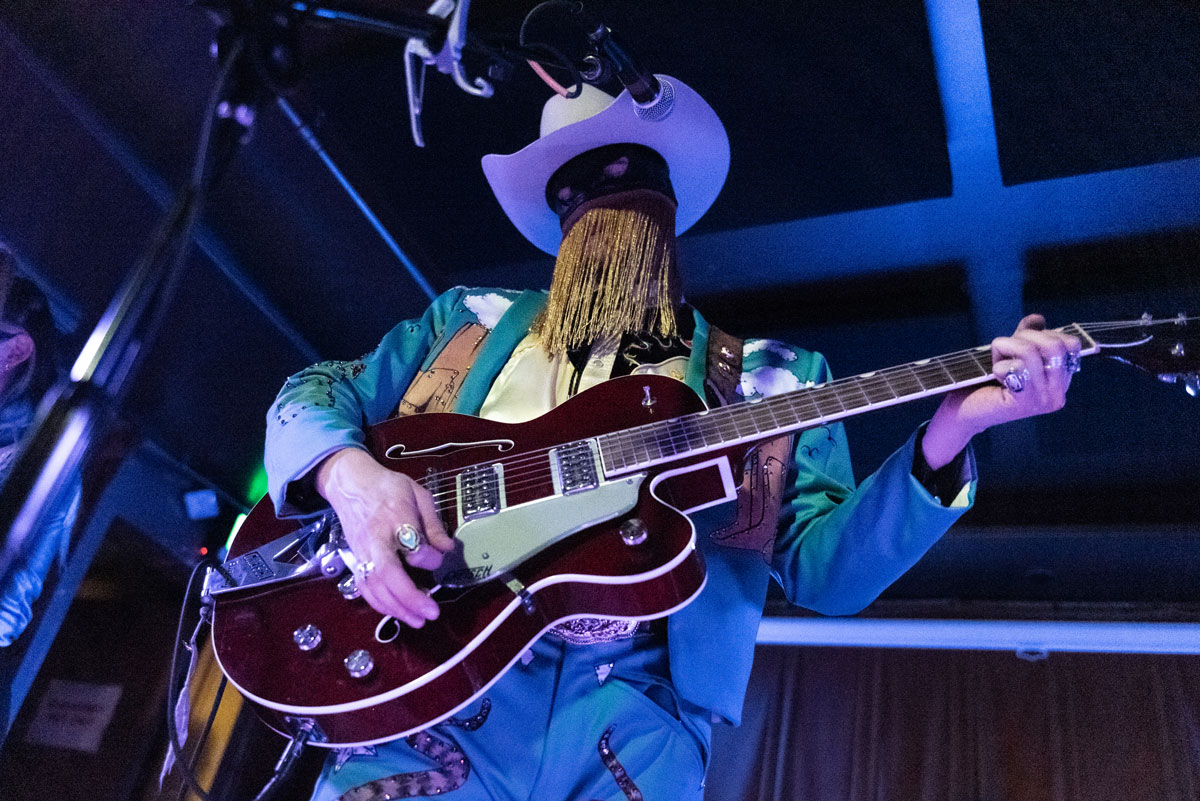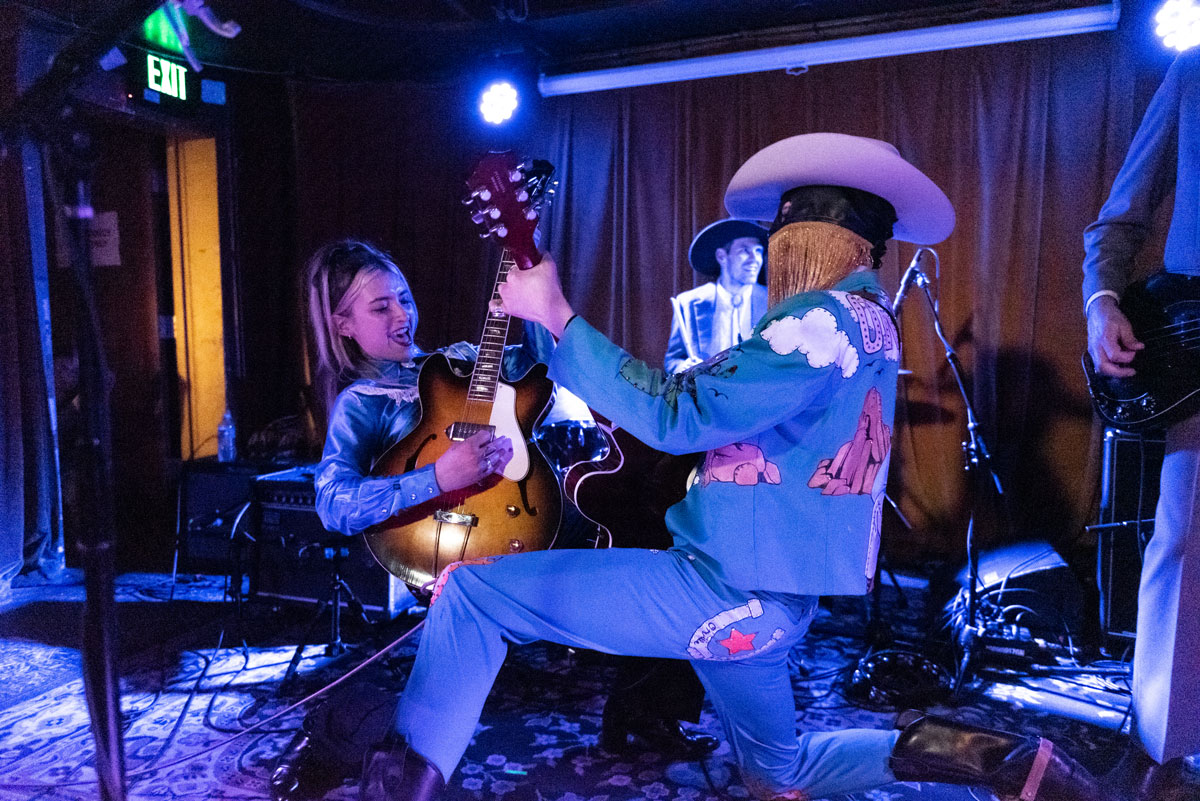Orville Peck: "I learned to play guitar without the high E string - I didn’t know how to change it when it broke!"
The man behind the mask on his musical roots, the future of country music and his new six-track EP, Show Pony

Songwriter and performer Orville Peck has, in a few short months, become a worldwide country music phenomenon. The big-voiced crooner rocketed to fame and attention in 2019 with his track, Dead of Night, which featured his looming, moody guitar playing coupled with his Liberty Bell-like voice.
Peck, as many fans know, has kept his real-life identity something of a mystery, showing up for interviews and appearances wearing a cowboy hat and a fringe leather mask, which dangles at his chest.
Many have speculated on his identity but that is not something we’ve preoccupied ourselves with here. Instead, what we care about is Peck’s glorious voice, his precise guitar playing and his overall wondrous mystique.
We caught up with the six-string player to talk about how he first fell in love with music, what he loves about country, which guitars are his favorite (and most prolific) and more. Peck releases his new EP, Show Pony, today.
When did you first come to music as a young person?
"There was always music in my house. My parents listened to a big, diverse mix of artists. Everything from, like, glam rock to soul music and '60s pop. My father was big into bands like AC/DC and The Who and things like that.
"So, I had a very diverse musical upbringing and I also, obviously, fell in love with country music at a young age. And I also fell in love with punk at a young age. So, I feel like I listened to pretty much everything growing up. I still have diverse music tastes because of that."
Get The Pick Newsletter
All the latest guitar news, interviews, lessons, reviews, deals and more, direct to your inbox!
What made you want to invest yourself in music, personally, beyond just listening to it?
For me, I don’t know anything about the technical side of music, really
"I taught myself how to play a bunch of instruments when I was young. My father always had an acoustic guitar around the house. So, I would just, like, play around on that from when I was very little.
"I had an old Casio keyboard that took huge, like D batteries, or whatever those were. And I would play on that and teach myself some piano. And I would just sing all the time. I would sing along to records and I kind of just taught myself everything when I was little because I never really had any formal training in music as a kid.
"But I think that’s the best way to invest in music. Because I think it’s really taught me to approach music from a creative place rather than a technical place. I mean, I think both are really valid. But, for me, I don’t know anything about, like, the technical side of music, really.
"My bandmates are always helping me with chords and things because I don’t even know what anything’s called still. I feel like there’s two schools of thought about it but I definitely approach things from more of the, like, DIY space."

This is an odd question but was there a moment when your voice went from a more average register to the deeper, fuller, more musical sound that you’ve become known for today?
"[Laughs] It’s funny you say that because there actually was kind of! For many years - I’ve got a pretty high register to my voice that I don’t use, like, that much, really.
"But for a long time, you know - so, once I was a bit older, I started singing a lot more and I took some singing lessons and things like that. I was always really certain that I had, like, a high voice. I would always sing in a tenor register. And then, in my mid- 20s, I went away to London and I did some training there and part of that training involved this holistic approach to what they call, 'Freeing that natural voice.'
I was so happy because I’d always wanted to be a crooner my whole life and I finally found out I could
"It sounds super [Laughs] ridiculous, in a way. And I’m kind of a cynic anyway. So, I went into this just thinking, 'Oh, whatever, this is going to be funny.' It was a lot to do with connecting your voice to what you’re singing about - it’s, essentially, like eliminating preconceptions about what you want your voice to sound like and what your natural voice really does sound like.
"It’s crazy because I basically gained, like, almost two octaves to my voice doing that work. That’s because I never knew I could sing low. It actually is where my voice sits more comfortably because I’ve just been convinced my whole life that I had a certain type of voice but then I did some work to help me find that.
"I was so happy because I’d always wanted to be a crooner my whole life and I finally found out I could."

What drew you to country music - was it the storytelling?
"I think as a child I was really taken with country music in general but, more specifically, the era of country-western stars from the late '60s and early '70s. I was really fascinated by the idea that something could be so theatrical and dramatic and full of color and rhinestone and all of these incredible bold things.
"And the storytelling was really bold but it was also coupled with, you know, what at the time I thought of as this kind of sadness and realness, which later I kind of figured out to be what was essentially sincerity or authenticity of lyrics and the themes in the music.
"And I think growing up as a weird, gay kid, I think I really connected onto those lyrics and those themes of heartbreak and isolation and feeling kind of like and outsider. Even though I didn’t realize it at the time. But looking back I think it makes a lot of sense that country music resonated so deeply with me because I think it checks all the boxes for someone like me.
"When I first discovered Dolly Parton, like, I thought she was Elvira or Pee-wee Herman, or something. I literally thought she was a character from, like, Sesame Street. I didn’t realize she was a real person at first because she was so over-the-top and larger-than-life. So, that’s kind of what I like to do with the music I make and the image I create."
You’re part of a shift in country music that, in a way, began with the first “out" country band, Lavender Country, and has continued through today in a big way with artists like you and Lil Nas X. Was being part of this shift an aim of yours or just a byproduct of your interest in country music?
I think there’s a stigma about what country music is - that it’s just straight white men singing about trucks, or whatever. But other perspectives have always existed
"I think it’s something I’m very proud to, I guess, be a part of. Because I do think there is a shift happening. I should clarify that by saying there has always been diverse perspectives within country music. That goes for queer perspectives and non-white perspectives, whatever you want to call it.
"Because I think there’s a stigma about what country music is - that it’s just straight white men singing about trucks, or whatever. But those other perspectives have always existed, like you said, with bands like Lavender Country.
"There’s a very unique history to specifically queer country. But I think the shift that’s happening now is just that there is an awareness on a greater level that’s been chipping away at the wall of whatever you want to call it - mainstream Nashville radio headquarters.
"And I think people like Lil Nas X has helped with that immensely. There’s even people who bring an allyship to that like Kacey Musgraves or Shania Twain or Dolly, even. So, yeah, I think it’s a very exciting time to be in country music because I think it’s more so that these perspectives that have always been there in country are finally getting the amplification that they need and people are finally taking them seriously.
"So, I wouldn’t be as bold as to say that I’m leading anything that hasn’t come before me. But I do feel very proud and excited to be a part of a time where it seems like my perspective is reaching more people than it would have, you know, even, say, 10 years ago."
You wrote, played and produced everything (or nearly everything) on your debut LP, Pony. What was that like for you - difficult, fulfilling?
"It’s annoying! [Laughs] It’s annoying and tedious! It was definitely worth it. It’s funny because especially with Pony, the reason that I played practically most of the instruments on it, it wasn’t because I was trying to be, like, [super-producer] Jack Antonoff, or anything.
"I literally just didn’t have anybody except myself to do it. So, it was purely out of desperation, I suppose [Laughs]. I don’t have a very good technical understanding of music but I pick up instruments very quickly because I think I understand playing instruments rather than, like, playing instruments, if that makes any sense.
"But, yeah, I still continue to produce all my music. I haven’t really worked with any producers as of yet. I’m a little more open to collaborating in that area these days, or at least bouncing ideas off of people or accepting other ideas.
"But, for the most part, I think I have a very clear vision of what I want to do. I don’t play all the instruments myself anymore because now I can the time in the studio down by a lot more now by having very accomplished musicians around me in my band. They can play the pedal steel a lot better than I ever will!"
Let’s talk guitars: what are your favorites? Is there one that really sticks out that you absolutely love? We're guessing it's a Gretsch…
My guitarist laughs at me all the time because he says I make my life really difficult. But it’s because I taught myself to play guitar with only five strings
"Yeah, for sure. Well, the first - I really only have Fender and Gretsch guitars. Mostly I play a White Falcon from Gretsch, which is my favorite guitar on the planet. And they were very, very kind to give me one. And I’m terrified to take it on tour.
"It’s so funny, I take it into every hotel room. I mean, I won’t keep it on the bus. I’m so afraid someone’s going to steal it! So, that’s, like, my absolutely number-one precious thing.
"I also really like the Tennessee Rose from Gretsch, which I used to play quite a bit. That’s kind of like my second Gretsch that I use.
"I also have a couple Fender Telecasters that I use, the American Classic Series Reissue. It’s the old Telecaster with the open cigar box part, or whatever it’s called. I’ve got a Stratocaster; I’ve got a Mustang.
"The only other guitar I’ve ever really had in my life, which I’ve actually written a lot of songs on, is my father’s sunburst Ibanez Concord from 1975. That was my father’s guitar that he always had around the house when I was growing up.
"The funniest thing is, like, for the longest time, because I taught myself how to play guitar on that guitar, I didn’t know how to change the guitar strings. So, I learned to play guitar without the high E string, because I didn’t know how to change once it broke.
"So, still, to this day, I always forget about notes on that string and I end up playing chords in a really strange finger pattern. My guitarist laughs at me all the time because he says I make my life really difficult. But it’s because I taught myself to play guitar with only five strings, essentially. But I’m working on it, you know. I’m trying to get my form down."

We don’t need to get into this a great deal, but, because of the mask you wear in public, you’re often asked the same question all the time about your identity. I don’t much care about the mask or what’s under it, but what is it like, as an artist, to always get asked about the same thing over and over?
"It starts to feel like Groundhog Day. Honestly, I think, for me, it’s funny. I think contrary to popular belief, I think I’m a pretty open book about things, in a sense. So, with most interviews, I just tend to try and get a sense of the person and have, like, a nice conversation about things. And I try not to do, like, the whole repeat yourself a million times in every press cycle.
"But, I mean, it’s just kind of part of it, isn’t it? I suppose people usually want to hear about the same things."
The past couple of years have been very successful for you, career-wise. Is that hard to balance, is it hard to remain grounded, does it cause a lot of pressure - or is it purely exciting?
I don’t assume anything’s going to last forever because I know sometimes it doesn’t. I just try to take it in stride
"I had an opportunity in my younger years to have a couple successful moments as a performer in my career. I think when I was younger, I never knew how to enjoy those moments in the moment, you know? I kind of let myself not really be present because I was just so concerned with trying to work hard.
"So, I think the one thing about all of the lovely successes that I’ve seemed to have in the past year or two is that I really try to soak them in and I don’t assume that anything’s going to last, you know, a couple of days beyond today.
"I don’t assume anything’s going to last forever because I know sometimes it doesn’t. I just try to take it in stride. I try to have fun and enjoy it. I try to laugh as much as I can!"
Is there a favorite song, line, moment or collaboration for you on Show Pony?
"I know it sounds like the thing to say because it’s about the EP. But, honestly, I think every song on the EP I’m so excited about because they’re all pretty different in a way. They’re all quite unique. And as with all of my albums, I kind of change between what song is my favorite a lot, you know?
"But I would have to say at the moment - it’s kind of like a sleeper, like what people might maybe think of as a B-side on the EP, or whatever. But it’s a song called Kids.
"Funnily enough, I play the guitar picking part throughout that song. It’s just me on acoustic guitar with a bass, as well. And I feel pretty proud of the picking pattern that I pull off on the acoustic on that song."
You’ve also said the new EP is more “confident” than past work. Why do you think that is?
I just really made the record that I wanted to make. And I’ve really been lucky where I think I’ve really maintained the spirit of that with Show Pony
"I think when I wrote Pony, you know, I just didn’t know if anybody was going to really give a shit [Laughs]. And I’ve been thinking about it - I know that’s probably part of the magic of what Pony was, is that I did it without any intention or, I guess, any preconception of an audience, or anything like that.
"I just really made the record that I wanted to make. And I’ve really been lucky where I think I’ve really maintained the spirit of that with Show Pony. I don’t feel like I allowed whatever you want to call it - success, or whatever - that we’ve had with Pony. I didn’t really allow that to make me nervous going into Show Pony.
"I really allowed it to encourage me to go further with the things that I might have even held back a little bit on Pony."
“A virtuoso beyond virtuosos”: Matteo Mancuso has become one of the hottest guitar talents on the planet – now he’s finally announced his first headline US tour
“His songs are timeless, you can’t tell if they were written in the 1400s or now”: Michael Hurley, guitarist and singer/songwriter known as the ‘Godfather of freak folk,’ dies at 83









